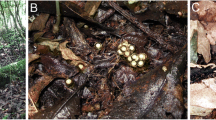Abstract
The direct-developing frog, Eleutherodactylus coqui, has eliminated the tadpole stage from its ontogeny, and lacks many larval characters. We demonstrate that the dermal folds of E. coqui are homologous with the opercular folds of metamorphosing frogs. In both E. coqui and its metamorphic counterparts the opercular folds grow over the developing forelimb before perforating to free the entrapped limb. Opercular perforation in E. coqui occurs even in the absence of the forelimb but shows no signs of thyroid hormone dependence. The condensation of E. coqui development appears due to the excision of the extended larval period of developmental stasis. Analysis of opercular development, when viewed in conjunction with other developmental characters, suggests the ontogenetic period in the ancestral Eleutherodactylus life-history from which the tadpole was likely eliminated.
Similar content being viewed by others
Author information
Authors and Affiliations
Additional information
Received: 7 October 1999 / Accepted: 17 January 2000
Rights and permissions
About this article
Cite this article
Callery, E., Elinson, R. Opercular development and ontogenetic re-organization in a direct-developing frog. Dev Gene Evol 210, 377–381 (2000). https://doi.org/10.1007/s004270000070
Issue Date:
DOI: https://doi.org/10.1007/s004270000070




